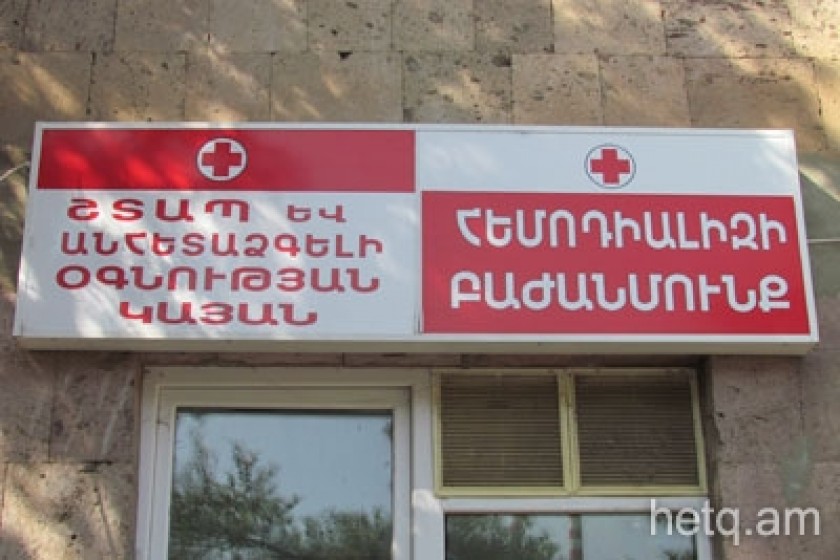
Dialysis Patients Getting "Drug Run-Around" at Armavir Hospital
Near total kidney failure has put Aram Manukyan in the hospital.
For the past five years, he’s been hooked to a dialysis machine three times a week.
Mr. Manukyan has been receiving treatment at the Armavir Medical Center for the past six months. Part of his treatment includes the expensive drug Rekarmon, needed to boost his red blood count.
He says the hospital has only given him the drug once in all that time.
Mr. Manukyan told me that in the past he was being treated at the Armenia Medical Center and the Malatya-Sebastia Hospital where he was regularly given the drug at his thrice weekly dialysis treatments. The patient says he felt fine at the time.
“Now, without the drug, I come out of dialysis in a near death state. I can’t move my arms or anything. I have to lie down for at least an hour after dialysis. And they shut down the machine halfway through because my blood pressure drops to 30/50. I am living by the grace of God. They prop me up in a chair and call for the taxi to take me home. Is this any way to live and get medically treated,” Mr. Manukyan complains, adding that the Armavir hospital staff says they don’t have the drug he needs and that the Natali Pharmacy doesn’t have it in stock either.
Mr. Manukyan says that they even haven’t given him a cheaper generic substitute during the past six months either.
“They don’t give me the cheaper replacement for Rekarmon, just something for my pressure.”
The 62 year-old man says doctors at the hospital are always giving him the run around, promising him they get the drug in a day or two or next week the latest. They never do.
Dr. Pavel Sedrakyan, who works at the Armavir Dialysis Unit, told Hetq that Rekarmon is prescribed to patients with haemoglobin deficiencies and all their patients have second level deficiencies.
He added that the drug must be provided to all dialysis patients free of charge. “There’s a shortage now. I don’t know the reason. Maybe something to do with the importation. Hopefully, we’ll get some soon.”
The dialysis unit at Armavir was opened six months ago. Dr Pavel says that Rekarmon was only given to patients the one time. He says they ran out afterwards. The drug is freely sold in pharmacies but it’s expensive. One dose costs 10,000 AMD. On average, patients should get five monthly doses of the drug – an expensive luxury for most.
Dr. Pavel escorted me to the dialysis unit where three patients were getting treated.
One of the patients, Navo Shamoyan, told me he hadn’t received Rekarmon in two months.
“Dialysis patients are in a bind. We can’t buy the drug we need on our own. It costs too much.”
Ashkhen Poghosyan, a health specialist at the Armavir Regional Governor’s Office, seemed surprised when she heard about the drug shortage.
“I’m hearing about it for the first time. No one from the Armavir Hospital or any of the patients ever raised the alarm.”
Poghosyan said that she and others from the Armavir Governor’s Office had made the rounds of the dialysis unit and all the patients expressed satisfaction with the treatment they were getting.
In our presence, she called up Samvel Bareghamyan, who was substituting for the Armavir Medical Center’s director.
Bareghamyan claimed the hospital had no drug problem and that they have sent a petition to get the drug and had indeed received a new Rekarmon shipment.
Poghosyan also called Dr. Pavel. He agreed that the order had been placed but that the supplier, Natali Farm was late in shipping out the Rekarmon and that the patients were getting a substitute drug.
She chided the doctor for not reporting the problem. I heard the doctor answer that the need for Rekarmon wasn’t critical.
Poghosyan promised to follow up on the matter.
That fact that all involved give a different account of the drug problem raises a number of concerns.
We spoke to Samvel Bareghamyan by phone from the house of dialysis patient Aram Manukyan. He was standing right next to us when the temporary hospital director claimed that the patients had received Rekarmon during the past month and advised us not to believe what the patients were telling us.
Upon hearing this, Aram Manukyan again stated that he had only received the one dose of the drug.
He was adamant on this point.
 Videos
Videos Photos
Photos
Comments (2)
Write a comment